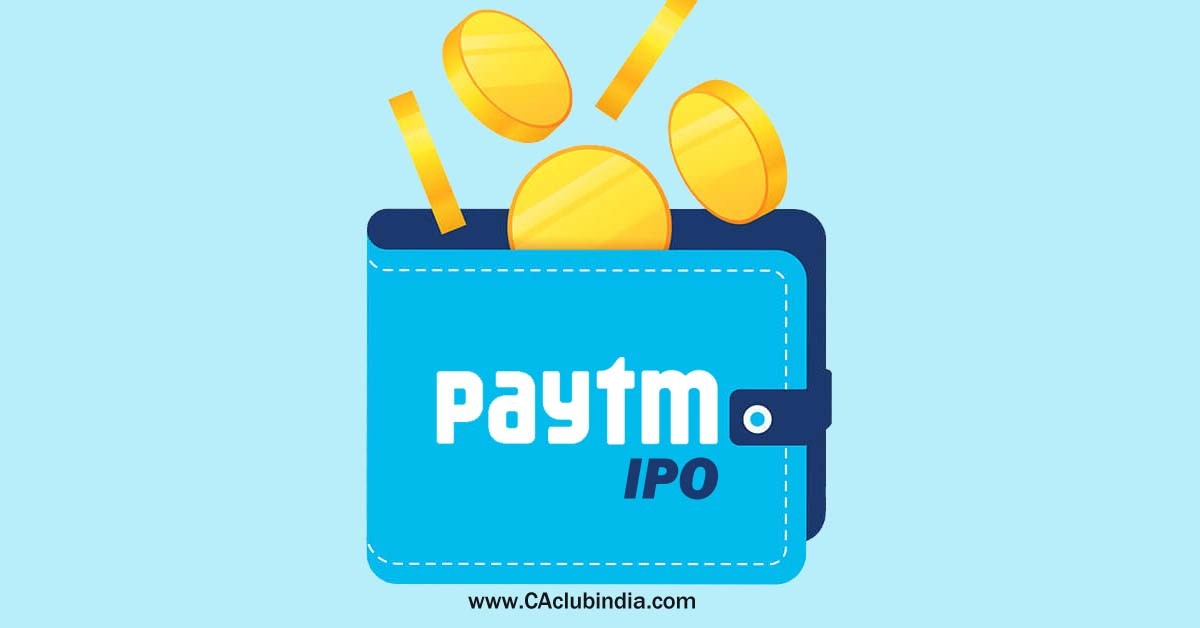India's largest public issue, Paytm's Rs. 18,300 crore IPO opened for subscription on Monday i.e 8th November and will conclude on 10th November.
History of Paytm
Incorporated in 2000, One97 Communications launched Paytm in 2009, India's leading digital ecosystem for consumers and merchants. It is a 'mobile-first' digital payments platform to enable cashless payments for Indians. It is the largest payments platform in India based on the number of consumers, merchants, transactions and revenue as of March 2021, according to RedSeer.

About the IPO
The public issue comprises Rs. 8,300 crore of fresh issue and Rs. 10,000 crore of Offer for sale by existing shareholders.
Paytm is available at a price of Rs 2,300 in the grey market, a premium of Rs 150 or 7 percent over the upper price band of Rs 2,150 per share, as per the IPO Watch.
Subscription on the day of the launch
At the end of Day 1, the issue was subscribed 18%. According to stock exchange data, as of 5 pm, the retail investor portion was subscribed at 78%, while the portions reserved for institutional investors and high net-worth individuals were subscribed 6% and 2%, respectively.
Price Band of the IPO
The price band for the offer has been fixed at Rs 2,080 to Rs 2,150 per equity share. The minimum bid lot size has been fixed at 6 equity shares and in multiples of 6 shares thereafter.
Hence, retail investors can invest a minimum of Rs 12,900 for a single lot and their maximum investment would be Rs 1,93,500 for 15 lots. Up to 75 percent of the offer is reserved for qualified institutional buyers, 15 percent for non-institutional investors, and the remaining 10 percent is for retail investors
The share allotment will get finalised by November 15 and then the funds will be refunded to unsuccessful investors by November 16. Eligible investors will receive shares in their demat accounts by November 17. The shares of the company are expected to list on leading stock exchanges BSE and NSE on November 18, 2021.
Morgan Stanley India Company, Goldman Sachs (India) Securities, Axis Capital, ICICI Securities, JP Morgan India, Citigroup Global Markets India, and HDFC Bank are the book running lead managers to the issue. Link Intime India is the registrar to the offer.
Utilization of the Funds
Paytm plans to utilize the proceeds of the issue to grow its business and acquire and retain merchants and customers and provide them greater access to technology and financial services. The fresh issue funds will also be used for new business initiatives, acquisitions and strategic partnerships (Rs 2,000 crore), besides general corporate purposes
What do the Experts have to say about the IPO?
Jyoti Roy - DVP- Equity Strategist, Angel One stated that “While valuations may appear to be expensive, Paytm has become synonymous with digital payments through mobile and is the market leader in the mobile payment space. Patym is well positioned to benefit from the exponential 5x growth in mobile payments between FY2021 – FY2026 and hence believe that the valuations are justified. We recommend investors to subscribe to the issue,"
Ravi Singhal, Vice Chairman, GCL Securities stated that "The growth shown by the revenue and loss ratio of Paytm doesn’t seem to be excited. However, company is being successful in narrowing its losses by restricting the branding expenses. Acquiring new merchants and customers will decide the further growth trajectory. The dependency of Paytm on payment services for majority of revenue is a key matter of concern. Keeping in view of overall business model, we advice investors to subscribe the issue,"
KRChoksey Research says there are two risks regulatory and execution, which investors have to consider before subscribing the public issue.
"Company comes under purview of 3 financial regulators viz RBI, SEBI and IRDA. Any unfavorable move by any of the regulator which can act as a barrier to revenue growth can materially impact the valuation. Any delay in execution in any of the business segment can potentially impact the valuation negatively as best case scenario is already priced in," the brokerage explained.








 CAclubindia
CAclubindia
